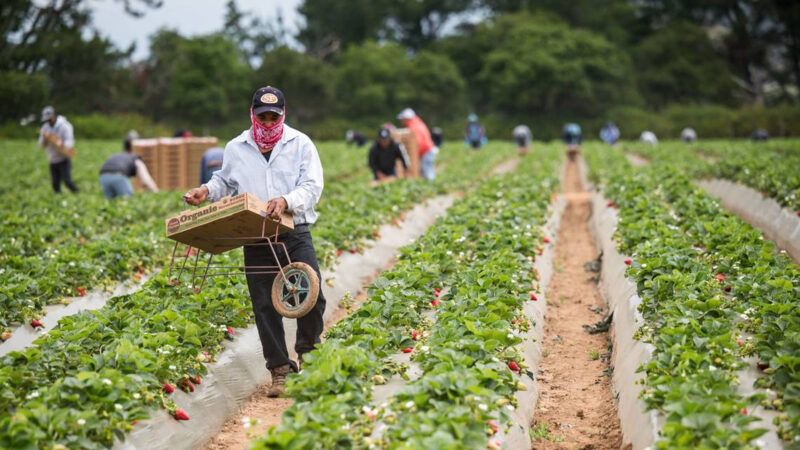How Mass Deportation Will Disrupt America's Food Supply Chain
We desperately need to reform visa pathways instead.

Grocery prices might not be rising as quickly as in previous years, but they were still a major factor in getting people to the polls during this month's elections. According to A.P. VoteCast, 96 percent of those surveyed considered high prices for gas, groceries, and other goods when they voted.
But the centerpiece of President-elect Donald Trump's immigration policy—his proposal to deport millions of undocumented immigrants—could badly disrupt the country's food supply and raise grocery costs, given the share of farmworkers and food workers who are undocumented. That possibility is a reminder of how urgently the U.S. needs to reform its agricultural visas and related pathways.
Immigrants make up a disproportionate share of the country's food production work force, including through the H-2A program, which provides visas for temporary agricultural workers. Though 17 percent of civilian workers from 2017 to 2021 were immigrants, per the Migration Policy Institute, 28 percent of agricultural workers, 25 percent of food production workers, 22 percent of grocery and farm product wholesalers, and 31 percent of crop production workers were foreign-born. Over one-third of meat processing workers and commercial bakery workers were immigrants.
Undocumented immigrants are heavily represented among foreign-born food production workers. Though they make up just 5 percent of the country's labor force, undocumented immigrants represented 15 percent of food production workers and 12 percent of food processing workers, an Investigate Midwest analysis of U.S. Department of Agriculture (USDA) and Pew Research Center data found. From 2020 to 2022, 42 percent of farmworkers were undocumented, according to the USDA's Economic Research Service.
Mass deportation could create labor shortages across many parts of America's food supply chain, limiting harvesting and production capacity for farms, wholesalers, and other businesses, and raising prices for consumers. Even a more modest version of Trump's deportation plan—which Vice President–elect J.D. Vance has suggested might involve removing 1 million people per year—would destabilize America's food supply chain. The Peterson Institute for International Economics projected that agriculture would suffer the worst inflation of any sector as a result of mass deportation, "which is not surprising as up to 16 percent of that sector's workforce could be removed, resulting in higher prices."
There's little reason to believe that native-born Americans will be willing to fill the arduous and repetitive food production roles currently filled by immigrants. The Department of Labor "has continuously raised H-2A minimum wages to induce U.S. workers to apply, but Department of Agriculture economists have concluded that 'farm labor supply in the United States is not very responsive to wage changes,'" wrote David J. Bier, director of immigration studies at the Cato Institute, in 2020. American workers "accept only 1 in 20 H-2A job offers," Bier found, "and most later quit."
The large share of undocumented farmworkers and other food workers in the U.S. indicates that legal pathways aren't working as they should. One potential fix is the Farm Workforce Modernization Act, which has been introduced in Congress several times and has passed the House twice. The bill would create a pathway to legal status for foreign workers who are continually employed in agriculture and modify the H-2A program to be more responsive to the forces of supply and demand, including by allowing the annual visa cap to increase or decrease more readily. This would grant American employers access to a more reliable labor stream and help divert would-be undocumented workers into legal pathways, reducing unauthorized migration and opportunities for abuse.
Mass deportation would come at a great cost to families, communities, and employers, and undocumented immigrants won't be the only people to feel the consequences. They could affect food supply and inflation in ways that are felt by all American consumers. That possibility alone underscores the urgent need to establish and improve visa pathways for the workers who keep America's food supply chain afloat.


Show Comments (87)